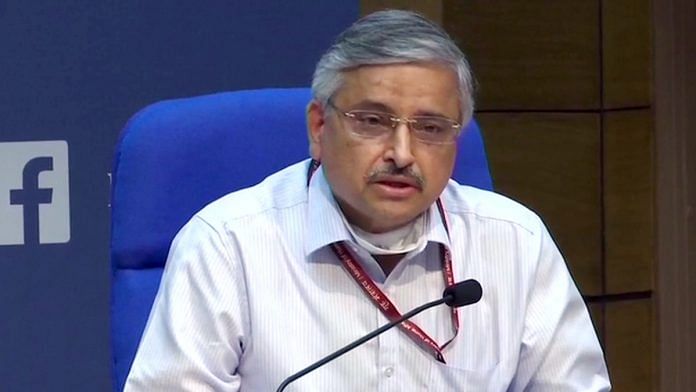New Delhi: India should have a Covid-19 vaccine by early next year if “there are no hiccups on the way”, said Dr Randeep Guleria, director at the All India Institute of Medical Sciences (AIIMS), Delhi. He, however, said that it will take at least a year to immunise the whole country.
“If all goes well, if we are able to get the safety and efficacy data, by early next year we should be able to get a vaccine,” Guleria said in an interview to ThePrint Friday.
He also said the first Covid-19 vaccine to become available may not be the most effective. India will hence need to keep evolving its vaccine distribution strategy, keeping in mind what is best for the country.
“We will need to continue to look at the vaccines as they come and the strategy of vaccination may evolve over the next year,” he added.
Guleria, however, stressed that people should not lose sight of the goal to have a sustained fall in Covid-19 cases. “To do that, we need to follow the non-pharmacological measure, which the prime minister has also been emphasising on — physical distancing, masking and hand washing,” he said.
Also read: Modi govt begins building database of healthcare workers for Covid immunisation drive
‘Vaccine distribution will take time, preparation’
The AIIMS director said a Covid-19 vaccine may get approval in the first two-three months of 2021 but manufacturing it on a large scale will take some more time.
“A lot of other things are already being done, such as manufacturing syringes and training healthcare staff,” Guleria said, adding that a strategy on which populations are to be first immunised will have to be worked out.
He also said most of the vaccines that are being developed will be two doses. “…so how do we give those two doses…those are the things being worked out. Once that is done, the vaccine will be rolled out.”
‘Must remain cautious to avoid a second wave’
Guleria also warned that while active cases have reduced over the past few days, it was still too early to say that the Covid-19 curve has been flattened.
“We have seen all over the world that the pandemic has its ups and downs. There have been times, for example in Delhi when we felt the curve had flattened, only to see it go up again. So we need to be cautious,” he said.
He also said that people have now reached a stage of “Covid-appropriate behaviour fatigue”, meaning they have become tired of living under restrictions for so long.
“There is a lot of frustration, especially among the younger generation who feel they will only get a mild infection and not realising that they may carry the infection home and cause problems for their parents or grandparents,” Guleria warned.
Giving an example of the 1918 Spanish flu, Guleria said that the second peak at the time was even bigger than the first one, mostly because people were just fed up with restrictions the government had imposed.
“They started having parties and get-togethers which led to a huge spike in the cases and the mortality rate. We must learn from history and be very careful about making sure that we don’t have a second spike,” he said.
He also said that the government was preparing for a second peak in cases after the festive season.
‘Timing of drugs important’
Commenting on the findings of a recent study that showed how none of the four repurposed drugs — remdesivir, hydroxychloroquine, lopinavir and interferon — have any benefits on the patients of Covid-19, Guleria said that a lot depends on when medicines are given.
“Most of these drugs do have some role, but it is more about when we give them. For example, we now know that steroids are useful, but we also know that giving steroids early on can be harmful. They should only be given when there is an oxygen requirement,” he said.
A recent ICMR study had also found that plasma therapy did not reduce mortality among Covid-19 patients. But Guleria said, “I personally feel that convalescent plasma, which we say is of no use, may be useful in the early stage when your own antibodies are not there.”
Similarly Remdesivir will be useful, he said, when viral replication just about takes place. If the virus has already replicated enough, then Remdesivir may not be that useful, he added.
“It is important to see the timing of the drugs that you give. It is too early right now to write off many of these drugs,” Guleria said.
You can watch the full interview here:
Also read: ICMR recommends dropping Interferon, adding cancer drug Acalabrutinib to WHO Solidarity trial



